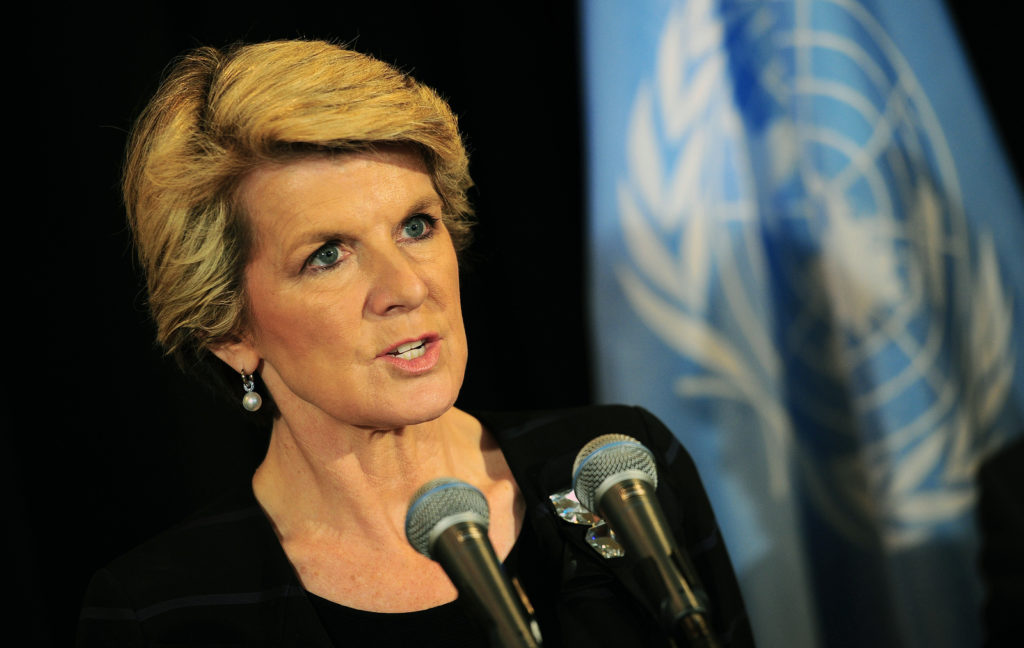IN THE MEDIA
Foreign Affairs Minister Julie Bishop is a true supporter of peace in the Middle East
December 2, 2013 | Sharyn Mittelman

The Foreign Minister is a friend of Israel and Palestine
Sharyn Mittelman
Canberra Times – December 2, 2013
Australia’s decision to change its position and abstain on two United Nations resolutions regarding settlements and the Geneva Convention was the act of a true supporter of Israeli-Palestinian peace. Explaining the decision to change the vote, a spokesman for Foreign Minister Julie Bishop said the shift ”reflected the government’s concern that Middle East resolutions should be balanced” and said: ”The government will not support resolutions which are one-sided and which pre-judge the outcome of final status negotiations between the two sides.”
The reality is that the UN’s entrenched biases against Israel – reflecting the imbalance of power between one Jewish state versus 22 Arab states plus 56 majority Muslim states – have rendered it ineffective as a mediator. Arab states have long sought to use the UN to delegitimise Israel and seek an affirmation of the narrative about Israel being a usurper state existing on ”stolen” Palestinian land.
Thus the resolutions in question presuppose the final borders of Israel and a Palestinian state, which undermine agreements made at Oslo that such issues be directly negotiated by the parties. In addition, it encourages the Palestinians to walk away from negotiations with Israel and pursue their goals in international forums.
Highlighting how ridiculous the UN has become recently was an unlikely source. A UN interpreter, unaware that her microphone was on, said: ”I think when you have, like a total of 10 resolutions on Israel and Palestine, there’s gotta be something, c’est un peu trop, non? [It’s a bit much, no?]. There’s other really bad shit happening, but no one says anything about the other stuff.” Laughter erupted among the delegates. But the matter is not funny.
By the end of its annual legislative session, the General Assembly is expected to adopt 22 resolutions condemning Israel – and only four on the rest of the world combined, with only one on the Syrian civil war that has led to more than 100,000 deaths and the use of chemical weapons.
Ms Bishop clearly recognises this problem, and this is doubtless why Australia decided to change its votes on two typically one-sided resolutions from ”in favour” to ”abstain”. These resolutions made prejudgments on key issues to be negotiated between the parties while making no demands of the Palestinian side, refusing to specifically acknowledge Palestinian terrorism, incitement or the rejectionism of Hamas, which rules Gaza. Australia’s allies the US and Canada voted against these resolutions.
The resolutions were regarding the applicability of the Geneva Convention and settlements in the West Bank. A true friend of peace recognises that while settlements are an issue that must be resolved in negotiations, housing construction in settlements is not the main obstacle to peace, as construction in West Bank settlements is not absorbing additional land that will ultimately be part of a Palestinian state, as is widely implied.
Israel has not built any West Bank settlements for more than 15 years. Since 2003 all settlement growth authorised by Israel has occurred within the existing boundaries of long-standing settlements under an agreement reached between Israel and the United States.
Furthermore, settlements themselves take up less than 2 per cent of the land in the West Bank, a fact acknowledged by Palestinian leaders. Finally, most settlement blocks, where the vast majority of recent construction has occurred, have long been expected to be retained by Israel in exchange for land swaps with the Palestinians. Even the Arab League has endorsed this idea.
The official position of every successive Israeli government since 1999 has been to support a two-state outcome and Israeli prime ministers Ehud Barak and Ehud Olmert offered a Palestinian state on land equivalent to nearly all of the West Bank, Gaza Strip and the Arab neighbourhoods of east Jerusalem. Meanwhile, demonstrating Israel can adjust its policy on settlements to facilitate peace talks, Prime Minister Benjamin Netanyahu instituted a 10-month moratorium on building in settlements in 2010 and recently cancelled controversial Housing Ministry long term plans for settlement units.
Israel and the Palestinians are in the midst of negotiations and together they will confront many tough issues: the future of Jerusalem, refugees, recognition of Israel as a Jewish state, relations with Hamas and settlements.
A true friend would know it is essential for the parties to decide the outcome of negotiations and encourage maximum flexibility rather than support UN resolutions trying to dictate what that outcome should be.
Sharyn Mittelman is a senior policy analyst at the Australia/Israel and Jewish Affairs Council.
Read more: http://www.canberratimes.com.au/entertainment/australian-foreign-affairs-minister-julie-bishop-is-a-true-supporter-of-peace-in-the-middle-east-20131130-2yiyr.html#ixzz2mH6aVMF8
Tags: Australasia





